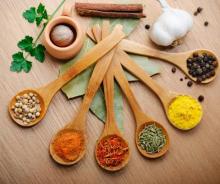
Strengthen Your Resolve with Healing Herbs and Foods
By Karta Purkh Singh
Raise your hand if it feels like we are facing more adversity in our lives these days. You know the signs—anxiety, edginess, fatigue, insomnia. Stress accounts for a good share of illness today, but it’s been with us since the beginning of human life. Only the stressors have changed. A bad day at work probably wouldn’t include an attack from a wild animal, but it just might include an attack from a wild boss.
It’s a good thing we have a powerful system of tools to keep us healthy and balanced. With yoga, we can build and maintain a solid foundation of stamina, and when tough times come along, we can eat adversity for breakfast.
Yoga and its sister science, Ayurveda, make up the ultimate holistic system for living as a graceful, effective human being; a system that encompasses positive and negative sides of every aspect of life on planet Earth, including our day-to-day behavior and conduct. These principles are designed specifically to achieve and maintain internal and external balance in the body (sharira), the senses (indriya), and the mind (manas).
It might not be immediately obvious, but herbs and foods are very powerful tools to heal the mind and emotions and help us stay resilient under stress. Yogis have classified certain herbs that have a particularly positive effect on the mind, open the heart, balance anger, and enhance communication Mental difficulties can arise from any tattva,[1] but commonly, the air tattva, which regulates the nervous system, is the culprit. To conquer fear and anxiety, get a grip on your air element.
Yoga concentrates on developing an understanding of the tastes of the foods you consume as a way to bring your variouspranasinto balance. Bitter taste, for example, is composed of air and ether tattvas, the same elements that predominate in the mind. Herbs with bitter taste generally open the mind, increase the sensitivity of awareness, and improve mental function. Bitter tasting herbs are cooling, calming, and mind expanding, so they combat mental dullness, which sounds ideal for the times in which we live. Chamomile and gotu kola are bitter mind herbs. Sweet taste, composed of earth and water tattvas, is grounding and calming. Use the sweet herbs ashwaganda and licorice to stabilize yourself in a crisis.
Yogi Bhajan recommended many remedies for supporting your mental stamina, and he frequently spoke about amla—it was the first herb he taught me about. This sour fruit is a first rate herb for the mind, with a reputation as the best herb for preserving youth and preventing senility.
Used with sesame, honey, and ghee in the morning, it is arasayana[2] that heightens the intellect. He was also a proponent of guduchi, an herb that balances all the tattvas, which when combined with gotu kola, shankpushpi, and powdered licorice promotes the intellect. Guduchi is also a cleansing and building herb, and it can be given to almost everyone as nectar to the body and mind. Another great herb for mental stamina, gokshura seed, enhances mental clarity, and I especially like it for its exceptional effect when used for depression, when nothing seems to be going right.
Bala root, whose name means “strength,” is probably the most widely used rasayana herb, second only to the famous ashwaganda. Its five tattva balancing nature is rare in the herb world, so bala is widely applicable, especially for the flighty air tattva. Bala is a sweet, cold, heavy herb that builds immune function. Bala contains five of the six tastes, a very rare property, so it is widely nourishing to all the body tissues. This soothing and mucilaginous root is combined with other tonics for specific organs.
For example, combined with arjuna it fortifies the heart. Bala increases libido, is anti-inflammatory, and helps support the lungs. You can think of bala as a cooling version of ashwaganda. For a real Ayurvedic experience, prepare bala as a milk decoction,[3] along with ashwaganda, by cooking it in milk like hot chocolate. Enjoy up to several grams per day, as tolerated, as powder, tea, or milk decoction.
Then there’s Dashmula, the famous “ten roots” formula, which is the ultimate anti-anxiety remedy for yogis. To stay mentally resilient, take a tablespoon per day as a tea, or prepare it with ghee in a soup, to keep you strong and steady.
Sure, we want to eat adversity for breakfast, but can’t we have a little food along with it? Enter oatmeal. This is one of the most mentally relaxing and anxiety stabilizing foods we can eat. This grain contains substances that nourish the nerves and control the air tattva, so it’s as much a medicine as a food. Have your daily serving with rejuvenating ghee and warming cinnamon, and you’ll be ready to stand up to anything.
Armed with a tummy full of oatmeal and a bloodstream full of yogic herbs, go forth and conquer your life, oh yogi!
 Karta Purkh Singh Khalsa, Yogaraj, DN-C, RH, is the president of the American Herbalists Guild. He mentored in Ayurveda with Yogi Bhajan for 32 years. The Healing Cures of Yogi Bhajan is his homage to Yogi Bhajan and the wealth of information he had the blessing to learn from his master. Karta Purkh has written over 3,000 articles on health topics and is the author or editor of 30 books on health, including his latest, The Way of Ayurvedic Herbs. He lives in the Northwest with his wife and daughter.
Karta Purkh Singh Khalsa, Yogaraj, DN-C, RH, is the president of the American Herbalists Guild. He mentored in Ayurveda with Yogi Bhajan for 32 years. The Healing Cures of Yogi Bhajan is his homage to Yogi Bhajan and the wealth of information he had the blessing to learn from his master. Karta Purkh has written over 3,000 articles on health topics and is the author or editor of 30 books on health, including his latest, The Way of Ayurvedic Herbs. He lives in the Northwest with his wife and daughter.
This article was written for 3HO.org - 3HO Lifestyle. To find original article click here>








